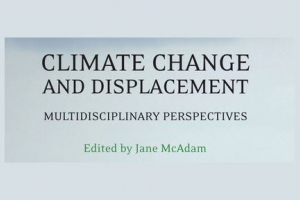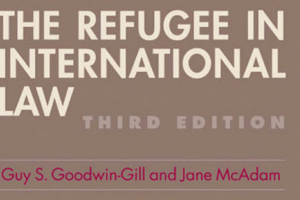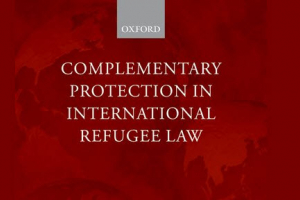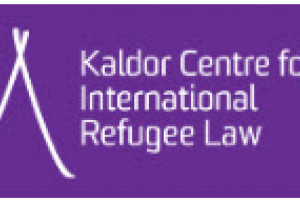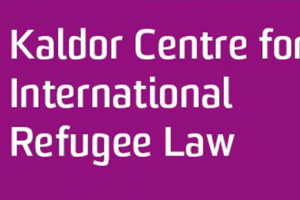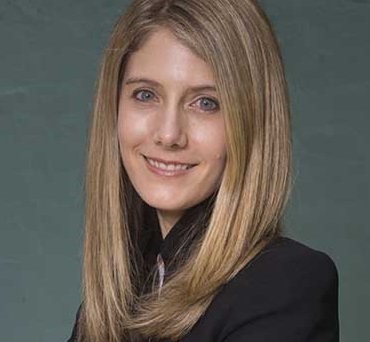
My Expertise
Refugees; refugee law; human rights law; international law; climate mobility; disaster displacement; evacuations; planned relocations
Keywords
Fields of Research (FoR)
International humanitarian and human rights law, Migration, asylum and refugee law, International and comparative law not elsewhere classifiedSEO tags
Biography
Professor Jane McAdam AO BA (Hons) LLB (Hons) (Sydney) DPhil (Oxford) is Scientia Professor of Law and an Australian Research Council Laureate Fellow. She was the Founding Director of the Kaldor Centre for International Refugee Law at UNSW Sydney where she now leads the Laureate Evacuations Research Hub. She is a Fellow of the Academy of the Social Sciences in Australia and the Australian Academy of Law; an Honorary Associate of the Refugee...view more
Professor Jane McAdam AO BA (Hons) LLB (Hons) (Sydney) DPhil (Oxford) is Scientia Professor of Law and an Australian Research Council Laureate Fellow. She was the Founding Director of the Kaldor Centre for International Refugee Law at UNSW Sydney where she now leads the Laureate Evacuations Research Hub. She is a Fellow of the Academy of the Social Sciences in Australia and the Australian Academy of Law; an Honorary Associate of the Refugee Studies Centre, University of Oxford; and a Senior Associate of the Refugee Law Initiative in London. She has held visiting appointments at Oxford and Harvard, and was previously a non-resident Senior Fellow in Foreign Policy at The Brookings Institution in Washington DC.
Professor McAdam publishes widely in international refugee law and forced migration, with a particular focus on mobility in the context of climate change and disasters. Her prestigious Australian Research Council Laureate Fellowship examines the legal underpinnings and practical challenges of evacuations across a range of contexts, including conflict, disasters and other humanitarian crises. Her legal analysis of both refugee law and climate-related displacement has been adopted by courts, governments and UN bodies, and her work has been highly influential in the development of international, regional and national policy frameworks. She was instrumental in drafting the International Law Association’s Sydney Declaration of Principles on the Protection of Persons Displaced in the context of Sea Level Rise in 2018, and was appointed in 2022 to lead the drafting of the Pacific Regional Framework on Climate Mobility.
Professor McAdam serves on multiple international committees, including the Advisory Committee of the Platform on Disaster Displacement; the Climate Migration Council; the Advisory Board of the Yearbook of International Disaster Law; the Academic Advisory Board of the Center on Forced Displacement, Boston University; the Advisory Council of the Institute on Statelessness and Inclusion; and the International Law Association’s Study Group on International Law, Human Rights and Islands. In 2024, she was appointed by the Australian Immigration Minister to the inaugural Ministerial Advisory Council on Skilled Migration Expert Sub-Committee. In 2025, she was appointed by the NSW Government to the inaugural NSW Settlement Advisory Council to advise on refugee settlement policy. For a decade, Professor McAdam was the joint Editor-in-Chief of the International Journal of Refugee Law, the leading journal in the field (2014–24), and she served for 12 years on the International Law Association’s Committee on International Law and Sea-Level Rise (2012–24), including as Co-Rapporteur (2012–18). She has also been an expert advisor to the United Nations High Commissioner for Refugees, the International Organization for Migration and the World Bank.
In 2017, Professor McAdam received the Calouste Gulbenkian Prize for Human Rights for her work on refugees and forced migration. She was honoured as a Young Global Leader of the World Economic Forum; named among Australia’s top ten Women of Influence, winning the ‘global’ category of the Australian Financial Review/Westpac’s 100 Women of Influence awards in 2015; and in 2017, she was one of four finalists for the NSW Premier’s Award for Woman of the Year. In 2021, she was appointed an Officer of the Order of Australia (AO) ‘for distinguished service to international refugee law, particularly to climate change and the displacement of people’. She received the Australian Human Rights Commission’s 2022 Law Award, the 2023 Law & Society Association International Prize (Honorable Mention), and was the inaugural winner of the Royal Society of NSW’s Award in the Humanities, Philosophy and Law in 2024.
My Grants
- Australian Research Council Laureate Fellowship, ‘Evacuations in International Law: Disasters, Conflict & Humanitarian Crises’ (2024–29, FL230100011)
- Australian Research Council Discovery Grant, ‘The Concept of “Imminence” in the International Protection of Refugees’ (2016–18, DP160100079, with CIs Foster and Lambert)
- Research Council of Norway, ‘Climate Change and Sea-Level Rise in the Anthropocene: Challenges for International Law in the 21st Century’ (2014–18, with collaborators from the UK, US and Norway)
- Australian Research Council Future Fellowship, ‘Moving with Dignity: A Human Rights Approach to Slow-Onset Climate Change-Related Displacement and Relocation in the Pacific’ (2011–15, FT110100721)
- Australian Research Council Discovery Grant, ‘Weathering Uncertainty: Climate Change “Refugees” and International Law’ (2009–11, DP0985793)
- Australian Research Council Discovery Grant, ‘Immigration Restriction and the Racial State, c. 1880 to the Present’ (2009–12, DP0984518, with CI Bashford and PI Amrith)
- Canadian Social Sciences and Humanities Research Council International Opportunities Fund, ‘War Crimes and Refugee Status: The Application and Interpretation of International Humanitarian and International Criminal Law to the Adjudication of Refugee Status in Canada, the United States, the United Kingdom, Australia and New Zealand’ (2009, with collaborators from the UK, US and Canada)
My Qualifications
BA (Hons) (Sydney)
LLB (Hons) (Sydney)
DPhil (Oxford)
My Awards
2015 - honoured as one of Australia’s top 10 Women of Influence
2015 - winner of the ‘global’ category of the 100 Women of Influence awards
2017 - winner of the prestigious international Calouste Gulbenkian Prize for Human Rights
2017 - finalist, NSW Premier’s Award for Woman of the Year
My Research Supervision
Supervision keywords
Location
The Law Building
University of New South Wales
UNSW Kensington Campus
Sydney NSW 2052
Australia
(Access via Gate 2 off High Street)
Contact
Publications
ORCID as entered in ROS
Research Activities
'Complementary protection' describes the obligations that States have under international human rights law to protect people who are at risk of serious human rights violations if removed, but who do not qualify as ‘refugees’ under the 1951 Refugee Convention. For instance, States are prohibited from sending people back to places where they face a real risk of being subjected to torture or cruel, inhuman or degrading treatment or punishment, or being arbitrarily deprived of their life.
This project examines the operation of complementary protection regimes around the world. It has a…

